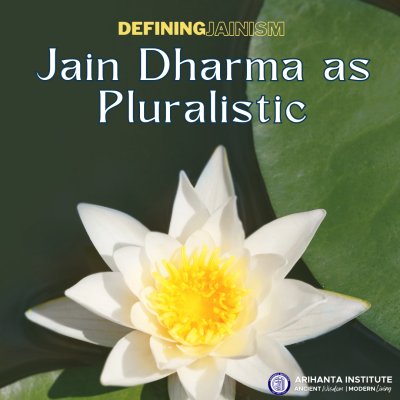Jain Dharma as Pluralistic

Jain Dharma as Pluralistic
Pluralism
Loosely defined, (and axiologically speaking) social pluralism is when a diverse society works towards common values by perceiving, valuing, and utilizing diversity as a source of social strength. Likewise, religious pluralism (also axiologically speaking) refers to valuing religious diversity as a source of societal strength, enhanced through interfaith dialogue, respect, and peacebuilding.
The Timeless Origins of the Tradition
The self-understanding of those in the Jain tradition is that it has “existed since time immemorial.” The basic idea behind this is that a soul free from the suffering from karma is the ideal towards which all Jains aspire, and since we all have souls, in a sense, we are all essentially Jains, and have been that way since beginningless time. As long as there have been living beings there have been beings dedicated to “conquering” (literally “Jina”) the suffering caused by karma, so therefore Jain Dharma is beginningless. As Arihanta Institute Founder and CEO Parveen Jain tells us, according to the tradition, “no single individual, book or canonical work can be attributed for its [Jain Dharma’s] origination” (Parveen Jain, 2019, 13).
Beings who have “conquered” the suffering caused by karma are known as “Jinas.” They are also referred to as “perfected ones,” or “siddha-s,” or Tīrthaṅkara-s, literally “those who have crossed beyond” the suffering of the material universe. Liberated beings are believed to occupy the Siddha-loka in the upper regions of the universe beyond even the heavenly realms. While they were present here in the lower realms, the world of karma (saṃsāra), they promulgated Jain teachings in ways that were relevant to the times in which they lived.
Thus, from the perspective of the tradition, Jain Dharma is believed to be a teaching that is relevant to any age, or to any group of people at any time in history or geographic location. Further, given that the natural state of the soul is transcendental, beyond the exteriorities of karmic bodily, psychologically, and socially constructed identities, Jain Dharma ultimately seeks to restore one’s true spiritual essence (jīva). In that sense Jain Dharma represents the natural wisdom of all souls, beyond sectarian considerations, and applicable to any era, and many in the Jain traditions sees its teachings as potentially an important unifying force amongst the diversity of world religious traditions.
Lord Mahāvīra
Lord Mahāvīra the most recent Tīrthaṅkara of the current era (the 24th in a lineage, believed to be born in 599 BCE) taught practitioners to focus on spiritual practices (sādhana) meditation, non-violence, self-control and austerity rather than outwardly ritualistic practices such as yajña, and was especially vocal against animal sacrifice that was current at that time.
For Jains, Lord Mahāvīra is often considered to have been socially progressive in the sense of resistance to the caste system, promoting gender equality in terms of establishing an order of nuns, and promoting a harmonious relationship with the natural world of living entities (jīva-s). For this reason, it is important that the Jain tradition is part of a pluralistic approach to addressing the issues of structural violence against humans, animals, and ecology in the modern, global era. A number of Jain organizations operate to promote the social messages and applications of the tradition as a means to reduce the violence of modern times.
Potential of Anekānta-vāda for Interfaith Dialogue
One might say that for Jains, interfaith dialogue and peacebuilding is sacred. For example, the Jain epistemology of Anekānta-vāda, “non-exclusivity,” teaches that, while we all share the same reality, no non-liberated person or perspective has claim to an “exclusive” (ekānta) vantage on truth. Likewise, Naya-vāda, or “perspectivism,” a subcategory of Anekānta-vāda, teaches that all beings have a legitimate “perspective” (naya) on reality and therefore any position must contain at least a kernel of truth, if we take the time to examine and listen to the positions of others.
Moreover, the truth in seemingly contradictory positions can be uncovered with the Jain transrational (avaktavya), dialectical logical system of Syāt-vāda (rather than binary systems such as classical logic). Syāt-vāda is a means of qualifying seemingly contradictory assertions so that one may reveal how even a contrary perspective “might” (syāt) have some truth to it when viewed in a certain way, or when it is qualified in such a way that it contrasts rather than contradicts other veracious truth-claims allowing for the possibility of synthesizing—rather than rejecting—a contrary position.
Perspectivism Defined
Religious pluralism, as a social model, is enhanced by the interfaith implications of Anekānta-vāda, Naya-vāda, and Syāt-vāda to form a system of philosophical perspectivism. In part, perspectivism faults the process of interpretation more than perception thereby valuing a person’s perceptive capacities while discounting a person’s—any person’s—interpretive mechanisms.
Perspectivism implies that our own body of knowledge is expanded—a soteriological requirement—when we engage in dialogue with those who’s perspectives differ from ours. This amounts to a call to the valuation of a pluralistic society and to participate in interfaith dialogue as part of spiritual growth. One might even say that one is likely not fully engaging in Anekānta-vāda unless one is participating in at least some interfaith dialogue and acting in a way to value the diversity of religions, cultures, ethnicities, genders, and other features of our diverse modern world.
Cogen Bohanec, MA, PhD currently holds the position of Assistant Professor in Sanskrit and Jain Studies at Arihanta Institute where he teaches various courses on Jain philosophy and its applications. He received his doctorate in Historical and Cultural Studies of Religion from the Graduate Theological Union (GTU) in Berkeley, California where his research emphasized comparative dharmic traditions and the philosophy of religion. He teaches several foundational self-paced, online courses based in Jain philosophy, yoga, ecology, languages, and interfaith peace-building, including:
